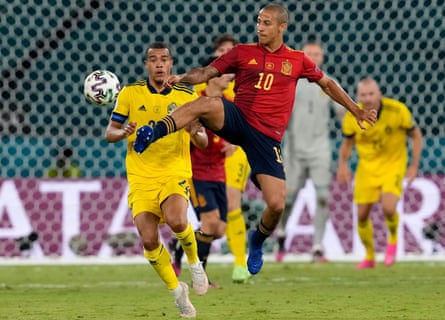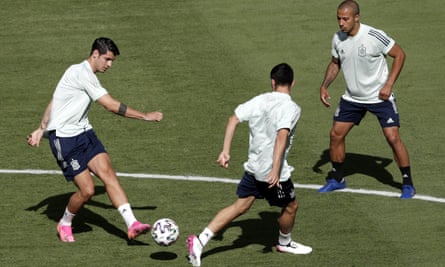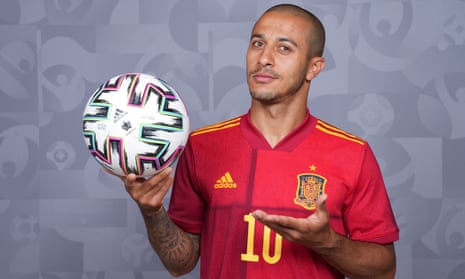“My dad has a phrase he always used and still does now: diversión con responsibilidad, fun with responsibility,” Thiago Alcântara says, sitting at Spain’s Las Rozas training base. “It’s like a motto we have between us, and I think you take that lesson into life too.”
What weighs more heavily, fun or responsibility? Football can be a suffocatingly serious business.
Yeah, but no matter how much my football has evolved towards something less fun than before, I’ve always been very responsible, even as a little kid. The question is and always has been how to fuse those two things, bring them together to be who I am.
And who are you? Born in Italy, a Spain international with a Brazilian World Cup-winning father, who has played in Germany and England. How does that shape your football?
The biggest change I’ve seen is generational rather than by place. Right from my dad’s era when I used to love watching what the players did, how they behaved before and during training. I would ask him everything, what they drank before games – I remember the fruit smoothies. You start to play and see Xavi, Andrés [Iniesta], [Carles] Puyol, you keep going and see shifts, which are more generational than cultural. But it’s true that the leagues have different identities and that forms you.
How is football different from when you started?
It’s taken up a different pace, rhythm: more accelerated, more physical. The figure of the No 10 has almost disappeared. We see less magic, less fantasy. Footballers do more but faster. There’s no need to dribble because you run. Players are more developed in every sense. You lose that player who’s different, who ‘breathes’; the playmaker who was slower even if he had sublime technique doesn’t get the opportunity to turn. Those of us who are not so fast with our legs have to be faster in our heads. It’s like anything in life: adaptation. Things keep moving. Football changes constantly, expressed differently.
How do you explain the increase in intensity?
It’s something I’ve seen, especially in the national team. You get young players arrive who are quick, full of desire, well-prepared, very diligent. When I was 18, I would grab a coffee, sit, chat, and then five minutes before training put my boots on and go out. Now, 30, 45 minutes before, they’re in the gym preparing: mobility, strength work. Things evolve. We didn’t do that because no one explained it to us.
Do you now? Do older players copy that generation?
We feed off each other. It’s the other way round [too]. The young players see older players: ‘I have to reach that level.’ Older players embrace those ideas of development and preparation after an injury or by seeing it and thinking: ‘I’ll try that.’ There’s a greater consciousness of how to improve and with time we’ll become aware of new ways. What matters is maintaining that beauty, that technique.
Such as?
Pedri’s an example of that old talent. Everything is natural. He sees football the same way he has since he was very little.
Is there a risk of losing that? Is it the managers’ fault?
You can’t blame managers. Football is a collective sport. If the collective works you don’t need [that magic] … in the end, that magic appears naturally in a moment of adversity. And if you know the movements you have to make, the passes you have to give, the way you defend, there are few great adversities. When there’s adversity, you’re surrounded by opponents, when you haven’t got the passing angle you want, when you have to do something different – that’s the magic, improvisation. Can I dribble? I’m going to dribble. Football has developed in a way that means players think more about collective functioning than that moment of individualism.
Has Covid changed the game?
Coaches can communicate with us better, players can communicate with each other more. You lose competitiveness but develop other aspects. Extra substitutions mean teams that defend, defend to the 90th minute; teams that press you, press you to the end. I have that ‘hate modern football’ mentality; I’m more classic in attitude. And then there’s VAR, which I’ve always opposed. It removes the essence, the picaresque. We make mistakes when we play, referees have to make mistakes too. Lots of mythical moments wouldn’t exist [with VAR]. And when you score, even a brilliant goal from the halfway line, you’re waiting. Thinking: ‘I hope there isn’t a foul in the buildup, I hope there’s no offside, I hope …’

You talk about generational shift but geographical shifts shape you too. Teammates, new countries, different coaches from different places.
Of course. The Spanish player is more technical, in Italy more tactical. In England the pace is higher, in every sense. In Germany, it’s more the transition defence-attack, attack-defence. In France, young players develop in high-performance centres, so they are more developed, particularly physically. Having teammates from other places, playing abroad, means learning elements that break your usual confines, enriching you.
You’re one of 65 footballers at Euro 2020 playing for a country other than the one they were born in.
The world has always moved that way, all cultures are a mix. We’re simply confirming now what we always knew. We are the place or places that shaped us, where we were born, raised, everything. I have no borders culturally, always open to learning. You have to be yourself, develop according to your own tastes, your own experiences, the things you learn. Also, you’re expressing the football of your country, not necessarily what your country is. It’s lovely to see that mix of cultures. Brazil for example: Brazil has that African mestizaje [mix] and is the most developed football country in the world. France has a spectacular mestizaje, incredible footballers. Football is a form of communication and escape. When you see how many millions follow football, the satisfaction and emotion after a game, you see its importance, but it’s still a sport.
Can that be overwhelming? To think people’s happiness depends on you…
The reverse. You seek motivation in that, not pressure. We’ve all grown up with pressure and love it. We prefer a stadium with 90,000 in than a stadium with none.

You’ve been coached by Guardiola, Tito Vilanova, Ancelotti, Hansi Flick, Klopp, Luis Enrique and many more. How do you compare them and how have they shaped you?
From the outside you have a view of coaches turned on the professional level; as players, we have a different view because it goes back to the start. I probably have more affection for the coaches I had as I developed than as a professional. If I tried to run through all the coaches that formed me, pfff, I’d be ages.
When he arrived at Bayern, Pep said: Thiago or nothing. How did that make you feel?
That was a gigantic source of motivation. I arrived at Bayern young and for Pep, who had coached me at Barcelona, who had given me opportunities [despite] having great players ahead of me, who had constructed that football, to see all those players at Bayern and say, ‘Thiago, I want you in my team’… that was huge. I always demand the best from myself and if that’s alongside the best coach in the world, even better.
Klopp’s style is very different, and then here’s the national team. Is Luis Enrique a kind of hybrid?
I think there’s a bit of everything and everyone in every coach. It’s easy to adapt to Luis’s football because he has the analytical positioning of Pep, the aggressiveness of Klopp, lots of the things I saw at Bayern. He’s very good at explaining what he wants: he has very clear ideas, which we’ve been working on for three years, and transmits those very directly. New players come in but they grasp those concepts quickly because not only does he choose players who have good feet and that aggression, but players who are intelligent.
On Saturday, you face Robert Lewandowski. Have you spoken?
Not yet but we will. We spent six lovely years together and that’s the nicest thing about football – the friends made along the way. He’s a great player and if there had been a Ballon d’Or last year, he would have won it. It seems unfair the award couldn’t have been given online. His development is not just physical, it’s mental. He gets over 30 goals every year but keeps practising, perfecting what he does well and working on what he doesn’t. That’s what makes him. A born winner, a perfect professional.
Is he obsessive?
Obsession is always there at the start of learning. Becoming obsessed with something is what allows you to learn, to develop a habit, turn it into a routine. And he has created a way of life. A striker’s obsession is goals but he’s not obsessive now; he’s calm because he has created a habit.
What about Álvaro Morata? He’s under intense pressure to score goals now.
You demand goals from strikers but we have to demand goals from ourselves as well, just as Álvaro Morata demands of himself the work that he does, breaking his balls defending. We need goals? Right, we’ll try to do that, all of us. Same goes for Poland.
Watching the Euros, which teams would you like to play in?
I don’t think about which country I’d like to play for – I love playing for the national team I’m in – I think more about the team I’d build with the players I’ve watched. I could make four or five teams.
Could you do an XI?
My XI – no, my 24 – are all here with Spain. You watch, reach conclusions but not so much, ‘Oh, how nicely they play’. I have an eye on their footballing proposal. France and Italy best develop the idea they have. Portugal have an idea. Germany. England have a huge potential. In terms of talent, they’re spectacular. We have an idea, not just with Luis but further back.
What did you think when you saw what happened to Eriksen?
Please, let him be OK. We were going out to train and everyone’s heads were in their hands: please let him recover. At that moment, football falls away, except that … we were on our way out to train and there’s a mix of, ‘What are we doing playing football?’ and yet at the same time, ‘I hope he recovers, obviously first of all so that he can live his life but also so that he can play football again’. You get that mix of emotions: a kind of rejection, not wanting to play, wondering what the point is, at the same time as a feeling that says: how lovely it is to do this, how fortunate we are to play football.
